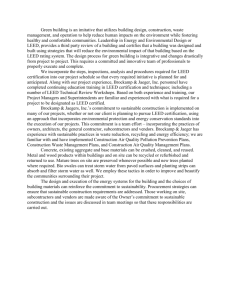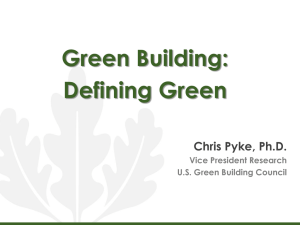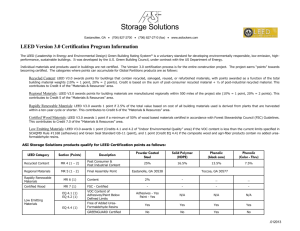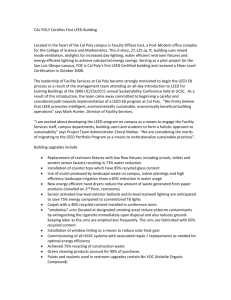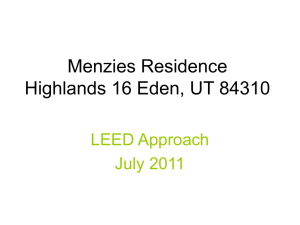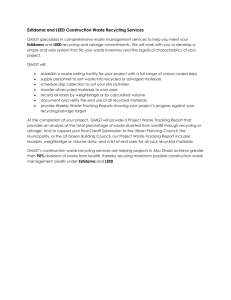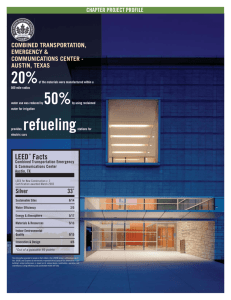Section #01 35 21 - LEED® Requirements
advertisement
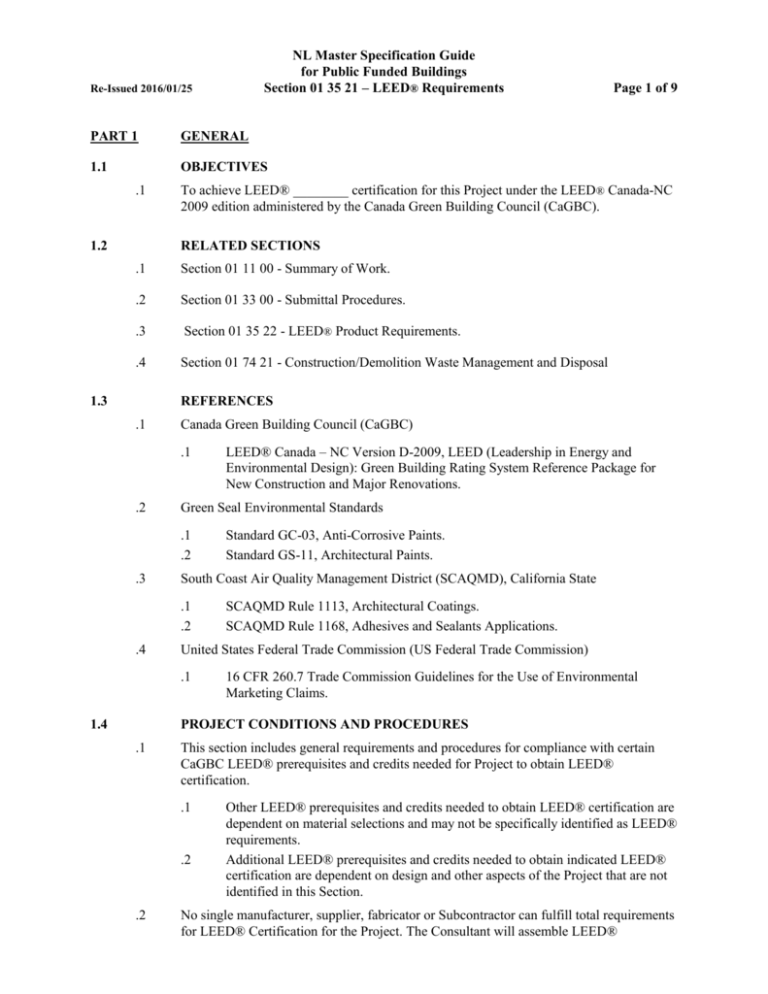
NL Master Specification Guide for Public Funded Buildings Section 01 35 21 – LEED® Requirements Re-Issued 2016/01/25 PART 1 GENERAL 1.1 OBJECTIVES .1 1.2 Page 1 of 9 To achieve LEED® ________ certification for this Project under the LEED ® Canada-NC 2009 edition administered by the Canada Green Building Council (CaGBC). RELATED SECTIONS .1 Section 01 11 00 - Summary of Work. .2 Section 01 33 00 - Submittal Procedures. .3 Section 01 35 22 - LEED® Product Requirements. .4 Section 01 74 21 - Construction/Demolition Waste Management and Disposal 1.3 REFERENCES .1 Canada Green Building Council (CaGBC) .1 .2 Green Seal Environmental Standards .1 .2 .3 SCAQMD Rule 1113, Architectural Coatings. SCAQMD Rule 1168, Adhesives and Sealants Applications. United States Federal Trade Commission (US Federal Trade Commission) .1 1.4 Standard GC-03, Anti-Corrosive Paints. Standard GS-11, Architectural Paints. South Coast Air Quality Management District (SCAQMD), California State .1 .2 .4 LEED® Canada – NC Version D-2009, LEED (Leadership in Energy and Environmental Design): Green Building Rating System Reference Package for New Construction and Major Renovations. 16 CFR 260.7 Trade Commission Guidelines for the Use of Environmental Marketing Claims. PROJECT CONDITIONS AND PROCEDURES .1 This section includes general requirements and procedures for compliance with certain CaGBC LEED® prerequisites and credits needed for Project to obtain LEED® certification. .1 .2 .2 Other LEED® prerequisites and credits needed to obtain LEED® certification are dependent on material selections and may not be specifically identified as LEED® requirements. Additional LEED® prerequisites and credits needed to obtain indicated LEED® certification are dependent on design and other aspects of the Project that are not identified in this Section. No single manufacturer, supplier, fabricator or Subcontractor can fulfill total requirements for LEED® Certification for the Project. The Consultant will assemble LEED® NL Master Specification Guide for Public Funded Buildings Re-Issued 2016/01/25 Section 01 35 21 – LEED® Requirements Page 2 of 9 information submitted for project and prepare required letters, calculations and spreadsheets for submitting to CaGBC. LEED® Certification requires cooperation and diligence of all project participants for a successful application and acceptance for LEED® certification. .3 Contractor is not responsible for the application of LEED® certification, nor for determination of methods of achieving LEED® credits, unless specifications require compliance to be achieved by Contractor for specific LEED® credits. .4 Contractor is required to become familiar with relevant LEED® Certification requirements and provide necessary information and instructions to all Subcontractors, suppliers, installers and other entities subordinate to Contractor. .1 .5 1.5 Provide a LEED® Construction Coordinator, assigned to work specifically on this Project, who is either a LEED® Accredited Professional (LEED® AP), has worked on previous LEED® projects, or has participated in a minimum of eight (8) hours of LEED® training. Contractor is required to provide complete compliance data and information for certain LEED® credits. LEED® credits for which Contractor is responsible for will be assigned by the Owner’s LEED® Consultant. LEED® CONSTRUCTION COORDINATOR .1 Designate an individual responsible for coordinating all LEED® related construction activities. .2 LEED® construction activities shall include: .1 .2 .3 .3 1.6 Coordinating with subcontractors and ensuring the successful implementation of LEED® strategies, programs and plans. Supplying the LEED® documentation and submittals outlined within this specification section and related sections to the Owner’s Representative to demonstrate that the LEED® requirements have been met. Reporting construction activity progress to the Owner’s Representative as it relates to LEED® features in the project. The LEED® Construction Coordinator is to be regularly on-site during construction. LEED® KICK-OFF MEETING .1 Prior to mobilization on-site, the LEED® Construction Coordinator shall hold a kick-off meeting with the Owner’s Representative to review the LEED® requirements. Include a review of: .1 .2 .3 1.7 LEED® certification and performance objectives. LEED® requirements and procedures. LEED® documentation and submittals. LEED® ORIENTATION MEETING .1 Prior to start of construction, the LEED® Construction Coordinator (in conjunction with the Owner’s Representative) shall hold an orientation meeting with the construction team NL Master Specification Guide for Public Funded Buildings Re-Issued 2016/01/25 Section 01 35 21 – LEED® Requirements Page 3 of 9 to explain the LEED® requirements to the sub-contractors and project staff. Include a review of: .1 .2 .3 1.8 LEED® certification and performance objectives. LEED® requirements and procedures. LEED® documentation and submittals. POSTINGS .1 1.9 The LEED® Construction Coordinator shall post up-to-date copies of LEED® Postings in a location that is easily accessible for review by all site workers and visitors. SUBMITTALS .1 Provide submittals in accordance with Section 01 33 00 – Submittal Procedures. .2 Submit required letters, calculations, spreadsheets and templates as required by Owner’s Representative. .3 LEED® submittals are in addition to other submittals. When submitted items are duplicated to that submitted to comply with other requirements, submit duplicate copies as separate submittals for compliance with indicated LEED® requirements. .1 Clearly highlight, delineate or otherwise indicate data within LEED® submittals showing compliance with applicable LEED® requirements. .4 Project Materials and Cost Data: Provide statement for total cost for building materials used for Project. Include statement indicating total cost of mechanical and electrical components. .5 LEED® Action Plan: Provide preliminary submittals within fourteen (14) working days of date for start of Work indicating how the following requirements will be met. .1 .2 .3 Materials and Resources Credit MR-2.1 Construction Waste Management; Divert 50% From Landfill and MR-2.2 Construction Waste Management; Divert 75% From Landfill. Prepare Construction Waste Management plan in accordance with Section 01 74 21 – Construction/Demolition Waste Management and Disposal. Materials and Resources Credit MR-4.1 Recycled Content 10% (post consumer + 1/2 post-industrial) and MR-4.2 Recycle Content 20% (post consumer + 1/2 postindustrial) Recycled Content. .1 Submit listing of recycled content products used, including details of required percentages or recycled content materials and products, showing their costs and percentages of post-consumer and post-industrial content, and total cost of materials for Project.. .2 Submit evidence, when Supplementary Cementing Materials (SCMs) are used, to certify reduction in cement from Base Mix to Actual SCM’s Mix, as percentage. Materials and Resources Credit MR-5.1 Regionally Materials: 10% Extracted and Manufactured Regionally and MR-5.2 Regionally Materials: 20% Extracted and Manufactured Regionally. Submit list of proposed regionally manufactured materials and regionally extracted, harvested, and recovered materials. .1 Identify regionally manufactured materials. .1 Identify source and cost. Re-Issued 2016/01/25 .4 .5 .6 Submit LEED® Progress Reports: with Applications for Progress Payments, submit reports comparing actual construction and purchasing activities with LEED action plans for the following: .1 .2 .3 .7 NL Master Specification Guide for Public Funded Buildings Section 01 35 21 – LEED® Requirements Page 4 of 9 .2 Identify regionally extracted, harvested or recovered material. .1 Identify source and cost. Environment Quality Credit IEQ-3.1 Construction IAQ Management Plan. Submit Construction indoor air quality management plan for construction and preoccupancy phases of construction. Low-Emmitting Materials: .1 Submit listing of adhesives, sealants, paints, coatings and carpet flooring used in building, showing compliance with VOC and chemical component limits or restriction requirements. .2 Submit listing of composite wood products and laminate adhesives used in building, stating that they contain no added urea-formaldehyde or ureaformaldehyde resins. Materials and Resources Credit MR-2.1 Construction Waste Management: Divert 50% From Landfill and MR-2.2 Construction Waste Management: Divert 75% From Landfill. Submit waste reduction progress reports in accordance with 01 74 21 – Construction/Demolition Waste Management and Disposal. Materials and Resources Credit MR-4.1 Recycled Content 10% (post Consumer + 1/2 post-industrial) and 4.2 Recycle Content 20% (post consumer + 1/2 postindustrial. Submit list of recycled content of materials. Materials and Resources Credit MR-5.1 Regionally Materials: 10 % Extracted and Manufactured Regionally and 5.2 Regionally Materials: 20% Extracted and Manufactured Regionally. Submit list of regionally manufactured materials and regionally extracted, harvested, or recovered materials. LEED® Documentation Submittals: .1 .2 .3 .4 .5 Submit product data for lighting fixtures for Sustainable Sites Credit SS-8.0 Light Pollution Reduction. Submit data for interior and exterior lighting fixtures that stop direct-beam illumination from leaving the building site. Submit product data for plumbing fixtures for Water Efficiency Credits WEp1 WE-3 Water Use Reduction: 30% Reduction – 2 points; 35% Reduction – 3 points; and 40% Reduction – 4 points. Submit Data for plumbing fixtures indicating water flow rates. Submit product data for Energy and Atmosphere Prerequisite IEAp3 Fundamental Refrigerant Management. .1 Include product data for new HVAC equipment indicating absence of CFC refrigerants and Phase-out plan to replace CFC refrigerants in HVAC&R systems with CFC-free refrigerants within the Construction Period. Submit product data for Energy and Atmosphere Credit IEA-4 Enhanced Refrigerant Management. Submit product data for new HVAC equipment indicating absence of HCFC refrigerants. Submit product data for Energy and Atmosphere Credit IEA-5 Measurement and Verification. Submit product data and wiring diagrams for meters and data collection systems for metering of building energy and water consumption performance. Re-Issued 2016/01/25 .6 .7 .8 .9 .10 .11 .12 .13 NL Master Specification Guide for Public Funded Buildings Section 01 35 21 – LEED® Requirements Page 5 of 9 Submit Construction Waste Management Plan for Materials and Resources Credit MR-2.1 Construction Waste Management: Divert 50% From Landfill and MR-2.2 Construction Waste Management: Divert 75% from Landfill. Comply with Section 01 74 21 – Construction/Demolition Waste Management and Disposal. Submit product data and certification letters for Materials and Resources Credit MR-4.1 Recycled Content: 10% and MR-4.2 Recycled Content: 20%. Submit product data and certification letter indicating percentages by weight of postconsumer and pre-consumer recycled content for products having recycled content. Include statement indicating costs for products having recycled content. Submit product data for Materials and Resources Credit MR-5.1 Regional Materials: 10% Extracted and Manufactured Regionally and MR-5.2 Regional Materials: 20% Extracted and Manufactured Regionally. Submit product data indicating location of material manufacturer for regionally manufactured materials. Include the following: .1 Statement indicating cost and distance from point of extraction, harvest, or recovery to project for each raw material used in regionally manufactured materials. Submit product data and shop drawing for Indoor Environmental Quality Credit IEQ-1 Outdoor Air Delivery Method. Submit product data and shop drawings for carbon dioxide monitoring system. Provide submittals for Indoor Environmental Quality Credit IEQ-3.1 Construction IAQ Management Plan. Include the following: .1 Construction indoor air quality management plan. .2 Product data for temporary filtration media. .3 Product data for filtration media used during occupancy. .4 Submit 6 photographs at 3 different times during construction along with description of utilized IAQ measures in accordance with SMACNA, documenting protection of ducts and on-site stored or installed absorptive materials from moisture. Provide submittals for Indoor Environmental Quality Credit IEQ-3.2 Construction IAQ Management plan: Testing Before Occupancy. Include the following: .1 Signed statement describing building air flush-out procedures including start and completion dates of flush out and statement that filtration media was replaced after flush-out. .2 Product data for filtration media used during flush-out and during occupancy. .3 Report from testing and inspecting agency indicating results of IAQ testing and documentation showing conformance with IAQ testing procedures and requirements. Submit product data for Indoor Environmental Quality Credit IEQ-4.1 LowEmitting Materials: Adhesives and Sealants. Submit product data for interior adhesives and sealants indicating VOC content of product used. Indicate VOC content in g/L calculated in accordance with SCAQMD Rule 1168. Submit product data for Indoor Environmental Quality Credit IEQ-4.2 LowEmitting Materials: Paints and Coatings. Submit product data for interior paints and coatings indicating chemical composition and VOC content for products used. Indicate VOC content in g/L calculated in accordance with Green Seal's Standard GS-11 and Green Seal's Standard GC-03 and SCAQMD Rule 1113. Re-Issued 2016/01/25 .14 .15 .16 .17 .8 Photographs shall be provided as specified in the related sections. All photos taken for LEED® documentation purposes shall conform to the following requirements: .1 .2 .9 NL Master Specification Guide for Public Funded Buildings Section 01 35 21 – LEED® Requirements Page 6 of 9 Submit product data for indoor Environmental Quality Credit IEQ-4.3 LowEmitting Materials: Flooring Systems. Submit product data for carpet products indicating VOC content in accordance with CRI Green Label Indoor Air Quality Test Program. Submit product data for Indoor Environmental Quality Credit IEQ-4.4 LowEmitting Materials: Composite Wood and Laminates Adhesives. Submit product data for composite wood and agrifiber products indicating products contain no urea-formaldehyde resins. .1 Include statement for adhesives use in fabrication of laminated assemblies. Submit product data and shop drawing for Indoor Environmental Quality Credit IEQ-6.2 Controllability of Systems: Non-Perimeter Spaces. Submit product data and shop drawings for sensors and control systems used for individual airflow, temperature and lighting for minimum 50% of non-perimeter, regularly occupied space. Submit product data and shop drawings for Indoor Environmental Quality Credit IEQ-7.2 Thermal Comfort: Monitoring. Submit product data and shop drawings for permanent monitoring sensors and controls system for temperature and humidity. High resolution digital images (1280 x 1024 or higher). Date stamp indicating YYYY-MM-DD. LEED® Letter Templates shall be completed and provided to Owner’s Representative as required for the LEED® certification submission package. PART 2 PRODUCTS 2.1 SALVAGED AND REFURBISHED MATERIALS .1 2.2 Materials and Resources Credit MR-3.1 Resource Reuse: 5% and MR-3.2 Resource Reuse: 10%. Supply salvaged or refurbished materials for 5 percent of building materials by cost. RECYCLED CONTENT OF MATERIALS .1 Materials and Resources Credit MR-4.1 Recycled Content: 10% (post-consumer + 1/2 post industrial). Supply building materials with a minimum post-consumer recycled content of 5% of cost of project materials or with a minimum post-consumer recycled content plus 1/2 pre-consumer recycled content of 10% of cost of project materials. .2 Materials and Resources Credits MR4-1 Recycled Content: 10% (post-consumer + 1/2 post industrial) and MR4-2 Recycled Content: 20% (post-consumer + 1/2 post industrial). Supply building materials with a minimum post-consumer recycled content of 10% of cost of project materials or with a minimum post-consumer recycled content plus 1/2 preconsumer recycled content of 20% of cost of project materials. Re-Issued 2016/01/25 .1 .2 .3 .4 2.3 NL Master Specification Guide for Public Funded Buildings Section 01 35 21 – LEED® Requirements Page 7 of 9 Cost of post-consumer recycled content of material will be determined by dividing weight of post-consumer recycled content in material by total weight of materials and multiplying by cost of material. Cost of post consumer recycled content plus one-half of pre-consumer recycled content of materials will be determined by dividing weight of post-consumer recycled content plus one-half of pre-consumer recycled content in material by total weight of material and multiplying by cost of material. Do not include mechanical and electrical components in calculations. Recycled content of materials in accordance with CAN/CSA-ISO 1402. REGIONAL MATERIALS .1 Materials and Resources Credit MR5-1 Regional Materials: 10% Extracted and Manufactured Regionally. Supply 20% of building materials (by cost) that are regionally manufactured. .2 Materials and Resources Credit MR5-2 Regional Materials: 20% Extracted and Manufactured Regionally. Supply 50% (by cost) of building materials that are regionally extracted, harvested, or recovered. 2.4 LOW-EMITTING MATERIALS .1 Indoor Environmental Quality Credit IEQ4-1 Low-Emitting Materials: Adhesives and Sealants. Interior applications requiring adhesives, sealants and sealant primers must comply with the following content limits for VOC of the State of California's South Coast Air Quality Management District (SCAQMD) Rule 1168. .1 .2 .3 .4 .5 .6 .7 .8 .9 .10 .11 .12 .13 .14 .15 .16 .17 .18 .19 .20 .21 Wood Glues: 30 g/L. Metal to Metal Adhesives: 30 g/L. Adhesives for Porous Materials (Except Wood): 50 g/L. Subfloor Adhesives: 50 g/L. Plastic Foam Adhesives: 50 g/L. Carpet Adhesives: 50 g/L. Carpet Pad Adhesives: 50 g/L. VCT and Asphalt Tile Adhesives: 50 g/L. Cove Base Adhesives: 50 g/L. Gypsum Board and Panel Adhesives: 50 g/L. Rubber Floor Adhesives: 60 g/L. Ceramic Tile Adhesives: 65 g/L. Multipurpose Construction Adhesives: 70 g/L. Fiberglass Adhesives: 80 g/L. Structural Glazing Adhesives: 100 g/L. Wood Flooring Adhesive: 100 g/L. Contact Adhesive: 80 g/L. Plastic Cement Welding Compounds: 250 g/L. ABS Welding Compounds: 325 g/L. CPVC Welding Compounds: 490 g/L. PVC Welding Compounds: 510 g/L. Re-Issued 2016/01/25 .22 .23 .24 .25 .2 Page 8 of 9 Indoor Environmental Quality Credit IEQ4-2 Low-Emitting Materials: Paints and Coatings. Interior applications use of paints and coatings must comply with the following limits for VOC content when calculated according to Green Seal Standard GS-11 and Green Seal Standard GS-03 and SCAQMD Rule 1113. .1 .2 .3 .4 .5 .6 .7 .3 NL Master Specification Guide for Public Funded Buildings Section 01 35 21 – LEED® Requirements Adhesive Primer for Plastic: 550 g/L. Sealants: 250 g/L. Sealant Primers for Nonporous Substrates: 250 g/L. Sealant Primers for Porous Substrates: 775 g/L. Flat Paints and Coatings: VOC not more than 50 g/L. Non-Flat Paints and Coatings: VOC not more than 150 g/L. Anti-Corrosive Coatings: VOC not more than 250 g/L. Varnishes and Sanding Sealers: VOC not more than 350 g/L. Stains: VOC not more than 250 g/L. Aromatic Compounds: paints and coatings not to contain more than 1.0% by weight total aromatic compounds (hydrocarbon compounds containing one or more benzene rings). Restricted Components: paints and coatings not to contain the following: .1 Acrolein. .2 Acrylonitrile. .3 Antimony. .4 Benzene. .5 Butyl benzyl phthalate. .6 Cadmium. .7 Di (2-ethylhexyl) phthalate. .8 Di-n-butyl phthalate. .9 Di-n-octyl phthalate .10 1,2-dichlorobenzene. .11 Diethyl phthalate. .12 Dimethyl phthalate. .13 Ethylbenzene. .14 Formaldehyde. .15 Hexavalent chromium. .16 Isophorone. .17 Lead. .18 Mercury. .19 Methyl ethyl ketone. .20 Methyl isobutyl ketone. .21 Methylene chloride. .22 Naphthalene. .23 Toluene (methylbenzene). .24 1,1,1-trichloroethane. .25 Vinyl chloride. Indoor Environmental Quality Credit IEQ4-3 Low-Emitting Materials: Flooring Systems. Re-Issued 2016/01/25 .1 .2 .3 .4 NL Master Specification Guide for Public Funded Buildings Section 01 35 21 – LEED® Requirements Page 9 of 9 Interior applications use of adhesives must comply with the following limits for VOC content: .1 Indoor Carpet Adhesive: 50 g/L. .2 Carpet Pad Adhesive: 50 g/L. Maximum allowable carpet emissions for carpet criteria to the following: .1 Total Volatile Organic Compounds: 0.50 mg/m2.h .2 4-PC (4-Phenylcyclohexene): 0.05 mg/m2.h .3 Formaldehyde (to prove that none is used): 0.05 mg/m2.h .4 Styrene: 0.40 mg/m2.h Maximum allowable carpet emissions for cushion criteria to the following: .1 Total Volatile Organic Compounds: 1.00 mg/m2.h .2 BHT (butylated hydorxytoluene): 0.30 mg/m2.h .3 Formaldehyde: 0.05 mg/m2.h .4 4-PC (4-Phenylcyclohexene): 0.05 mg/m2.h Indoor Environmental Quality Credit IEQ4-4 Low Emitting Materials: Composite Wood and Laminate Adhesives. Do not use composite wood and agrifiber products that contain urea-formaldehyde resin. PART 3 EXECUTION 3.1 SITE DISTURBANCE .1 3.2 Sustainable Sites Credit SS5-1 Reduced Site Disturbance, in accordance with Section 01 11 00 - Summary of Work. CONSTRUCTION WASTE MANAGEMENT .1 3.3 Credit MR-2.1 Construction Waste Management: Divert 50% From Landfill and MR-2.2 Divert 75% From Landfill. Comply with Section 01 74 21 - Construction/Demolition Waste Management and Disposal. CONSTRUCTION INDOOR AIR QUALITY MANAGEMENT .1 Obtain written approval from Owner’s Representative to operate permanent HVAC systems during construction. Operate permanent HVAC systems in accordance with Section 23 05 01 - Use of HVAC Systems During Construction. Install MERV-8 filter media in accordance with ASHRAE 52.2 at return-air inlets. .1 .2 Replace air filters immediately prior to occupancy. Replacement air filters to be MERV-8 in accordance with ASHRAE 52.2. Credit EQ-3.2 Construction IAQ Management Plan: Testing Before Occupancy. .1 Conduct 2-week building air flush-out upon construction completion with new air filters and 100 % outdoor air. Replace air filters after air flush-out. Replacement air filters to be MERV-8 in accordance with ASHRAE 52.2. END OF SECTION

